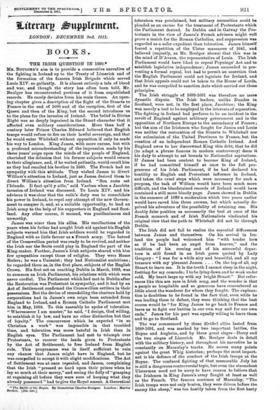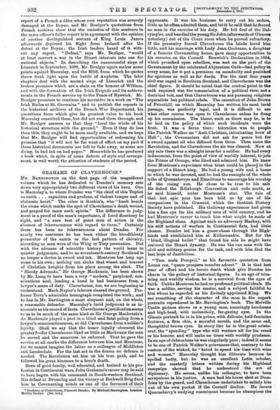BOOKS.
TH11. IRISH QUESTION IN 1690.*
MR. Doi:monies aim is to provide a consecutive narrative of the fighting in Ireland up to the Treaty of Limerick and of the formation of the famous Irish Brigade which served Louis XIV. so gallantly. It is almost entirely a tale of blood and war, and though the story has often been told, Mr. Beulger has reconstructed portions of it from unpublished records. He rarely deviates from his main theme. An open- ing chapter gives a description of the flight of the Stuarts to France in the end of 1688 and of the reception, first of the Queen and then of the King, but the second introduces us to the plans for the invasion of Ireland. The belief in Divine Right was so deeply ingrained in the Stuart character that it affected even military considerations. More than half a century later Prince Charles Edward believed that English troops would refuse to fire on their lawful sovereign, and that he would enter Whitehall without opposition if only be made his way to London. King James, with more excuse, but with a profound misunderstanding of the impression made by his three years' reign upon the minds of the people of England, cherished the delusion that his former subjects would return to their allegiance, and, if he waited patiently, would recall him as they had recalled his brother in 1660. The French had no sympathy with this attitude. They wished James to divert William's attention to Ireland, just as James desired them to divert William's attention from Ireland. "Son reate eat 1'Irlande. II faut qu'il y aille," said Vauban when a Jacobite invasion of Ireland was discussed. To Louis XIV. and his advisers it was clear that the exile's duty was to consolidate his power in Ireland, to repel any attempt of the new Govern- ment to conquer it, and, at a suitable opportunity, to lead an Irish army to the help of his supporters in England and Scot- land. Any other course, it seemed, was pusillanimous and unworthy.
James was wiser than his allies. His recollections of the years when his father had sought Irish aid against his English subjects warned him that Irish soldiers would be regarded in England with as little favour as a French army. The hatred of the Cromwellian period was ready to be revived, and neither the Irish nor the Scots could play in England the part of the King-maker. Further, James's Irish subjects shared with him few sympathies except those of religion. They were Home Rulers; he was a Unionist ; they had Nationalist ambitions ; he regarded them as, in the first place, subjects of the English Crown. His first act on reaching Dublin in March, 1689, was to summon an Irish Parliament, his relations with which were never cordial. The Parliament which had met in Dublin after the Restoration was Protestant in sympathy, and it had by an Act of Settlement confirmed the Cromwellian settlers in their possessions. But the device of remodelling the charters held by corporations had in James's own reign been extended from England to Ireland, and a Roman Catholic Parliament met him in May, 1689. To this assembly he spoke of toleration. "Wheresoever I am master," he said, "I design, God willing, to establish it by law, and have no other distinction but that of loyalty." The concurrence which he expected "in so Christian a work" was impossible in that troubled time, and toleration was more hateful in Irish than in English eyes. The Parliament had met to triumph over Protestants, to recover the lands given to Protestants by the Act of Settlement, to free Ireland from English rule. This programme was in itself sufficient to rain any chance that James might have in England, but he was compelled to accept it with slight modifications. The Act of Settlement was at once repealed, and James, complaining that the Irish " pressed so hard upon their prince when he lay so much at their mercy," and seeing the folly of "grasping at regaining all before they were sure of keeping what they already possessed " had to give the Royal assent. A theoretical The Battle of the Boyne. By Demetrius Charles Boulger. London : Martin Becker. 121s. net.]
toleration was proclaimed, but military necessities could be pleaded as an excuse for the treatment of Protestants which the Parliament desired. In Dublin and in Galway the Pro- testants in the view of James's French advisers might well prove a match for the Roman Catholics, and suppression was regarded as a safer expedient than toleration. James himself feared a repetition of the Ulster massacres of 1641, and believed (unjustly, as Mr. Boulger shows) that this was in the mind of D'Avaux, the representative of Louis. The Irish Parliament would have liked to repeal Poynings' Act and to establish legislative independence ; James succeeded in pre- venting a formal repeal, but had to permit an assertion that the English Parliament could not legislate for Ireland, and that Irish appeals could not be taken to the House of Lords, and he was compelled to sanction Acts which carried out these principles.
The Irish struggle of 1689-1691 was therefore no mere dynastic dispute. The Irish leaders, unlike Dundee in Scotland, were not, in the first place, Jacobites ; the King was merely a tool to be employed in the interests of separation. The fighting in Ireland had perforce to be an incident in the revolt of England against arbitrary government and in the opposition of Northern Europe to the ascendancy of France ; but the aim of the Irishmen who fought for James and Louis was neither the restoration of the Stuarts to Whitehall nor the submission of the United Provinces to France, but the creation of an independent Roman Catholic Ireland. And England owes to her discrowned King this debt, that he did (to adapt a phrase famous in modern controversy) deem it his duty to attempt to set bounds to Nationalist aspirations. If James had been content to become King of Ireland, if he had committed himself at once to the full pro- gramme of his Irish Parliament, if he had declared his hostility to English and Protestant influence in Ireland, and taken the cruel steps which were necessary for such a purpose, the task of William would have been much more difficult, and the bloodstained records of Ireland would have contained a still more bloody page. James showed in Dublin in the summer of 1689 a moderation which two years earlier would have saved him three crowns, but which actually de- prived his adventure of the possibility of retaining one. His doubly false position as necessarily the tool at once of the French monarch and of Irish Nationalists vindicated his original view that the path to Whitehall did not lie through Dublin.
The Irish did not fail to realize the essential differences between James and themselves. On his arrival in Ire- land the people had welcomed him " with tender love as if he had been an angel from heaven," and the tradition of his coming and of his sorrowful depar- ture is still found in an Irish poem quoted by Lady Gregory : "I was for a while airy and beautiful, and all my treasure with my pleasant James. . . . On the top of all, my Stuart to leave me. It is the truth I cannot sleep in the night, fretting for my comrade; Ito be lying down and he weak under cold- My heart leaps up with my bright Stuart." But refer- ences like this are rare in Irish song, and the wonder is that a people so hospitable and so generous have remembered so little about the wanderer for whom they fought. The explana- tion is doubtless to be found in the fact that, even while he was leading them to defeat, they were thinking that the best course would be " for King James to go back to France and leave us to fight our battles in our own way and for our own ends." James for his part was equally willing to leave them and to go to Scotland.
The war commenced by these divided allies lasted from 1689-1691, and was marked by two important battles, the Boyne and Laughrim, and by three great sieges—Derry and the two sieges of Limerick. Mr. Boulger deals in detail with the military history, and throughout his narrative he is constantly on Macaulay's tracks. He scores many points against the great Whig historian; perhaps the most import. ant is his defence of the conduct of the Irish troops at the Boyne. The confused fighting of that memorable July 1st is still a dangerous controversial topic, but even the staunchest Ulsterman need not be sorry to have reason to believe that the Irishmen in King James's army fought at least as well as the French. The famous sentence of Macaulay, "The Irish troops were not only beaten, they were driven before the enemy like sheep," was too hastily taken from the first hasty
report of a French s -Mier whose own reputation was severely damaged at the Boyne, and Mr. Boulger's quotations from French archives show that the omission of this sentence in the same officer's fuller report is in agreement with the opinion of another distinguished servant of King Louis. James afterwards deplored his flight from Ireland after the defeat at the Boyne ; the Irish leaders heard of it with- out any regret. "Defeat," says Mr. Boulger, "would at least convert a war in the Stuart interests into one for national objects." In describing the unsuccessful siege of Limerick in September, 1690, Mr. Boulger again makes some points against Macaulay, and the MSS. from which he quotes throw fresh light upon the battle of Aughrim. The later chapters deal with the second siege of Limerick and the broken promises which are a stain on the honour of William, and with the formation of the Irish Brigade and its achieve- ments in the French service up to the Peace of Ryswick. Mr. Boulger promises to continue his narrative in a work on "The Irish Exiles at St. Germains " and to publish the reports in the historical archives of the French War Department, his quotations from which give its greatest value to his book Macaulay consulted them, but did not read them through, and Mr. Boulger assures us that they "level the whole of his historical structure with the ground." Even if they do less than this, they ought to be more easily available, and we hope that Mr. Boulger will find opportunities of redeeming his promise that "it will not be for want of effort on my part if these historical documents are left to fade away, as some are doing, in bad ink on bad paper." Meanwhile he has produced a book which, in spite of some defects of style and arrange- ment, is well worth the attention of students of the period.



































































 Previous page
Previous page